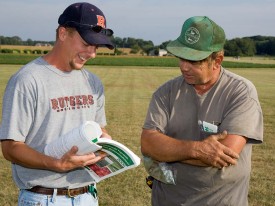By Nick Polanin, Rutgers Cooperative Extension of Somerset County Agricultural Agent
 The year 2014 marks the 100th anniversary of the signing of the Smith-Lever Act which officially created the national Cooperative Extension System. Rutgers New Jersey Agricultural Experiment Station (NJAES) Cooperative Extension helps the diverse population of New Jersey adapt to a rapidly changing society and improve their lives and communities through an educational process that uses science-based knowledge. Through science-based educational programs, Rutgers Cooperative Extension truly enhances the quality of life for residents of New Jersey and brings the wealth of knowledge of the state university to local communities.
The year 2014 marks the 100th anniversary of the signing of the Smith-Lever Act which officially created the national Cooperative Extension System. Rutgers New Jersey Agricultural Experiment Station (NJAES) Cooperative Extension helps the diverse population of New Jersey adapt to a rapidly changing society and improve their lives and communities through an educational process that uses science-based knowledge. Through science-based educational programs, Rutgers Cooperative Extension truly enhances the quality of life for residents of New Jersey and brings the wealth of knowledge of the state university to local communities.
I am a member of the Agriculture and Resource Management Agent Department, which delivers programs that assist commercial businesses, governmental agencies, agribusinesses and residents with information, field research, and consultation on various issues related to agriculture, environmental issues, and natural resources management: Integrated Pest Management (IPM), Master Gardener and Environmental Steward Programs, to name a few.
I recall applying for my current position as Agricultural and Resource Management Agent in Somerset County back in 1998, after nearly 15 years in commercial and residential tree care. The interview entailed a 45-minute seminar I presented on research I had completed, and then after a short break, an hour-long interview with the entire search committee, about 8-10 people. It was quite a rigorous selection process – as well it should be for a tenure track faculty position with Rutgers, the State University of New Jersey.
Land Grant Universities, such as Rutgers, Cornell, Penn State, etc. have an outreach mission mandate from their charter that created Cooperative Extension. There are a few Universities such as Rutgers that have tenure track faculty positions in Extension, while most others offer high level staff positions. Obtaining tenure involves two three-year contracts during which time your peers and professors from across the country review and critique the impact and scholarly advancements of all your efforts, from teaching and research, to publishing and service to the industry and community at large.
Though faculty and staff of Rutgers work alongside other county staff in the 21 offices of Cooperative Extension, we serve both the University and our individual counties. Faculty members teach not on campus but primarily for the commercial industry and residential audiences at events throughout the year. We follow the county calendar rather than the school calendar, and utilize county resources and facilities to assist us in our work. Some research and teaching faculty who are primarily on campus teaching graduate and undergraduate students also have a percentage Extension appointment, perhaps in Turfgrass or Forestry or IPM, and they will teach occasionally off campus to these same audiences.

Many Rutgers Cooperative Extension county offices have Master Gardener Helplines, which provide home gardeners assistance with their garden and lawn questions.
A ‘typical’ day in Cooperative Extension, though none actually ever existed, could begin with Master Gardener volunteers arriving to answer calls and walk-ins to the Garden Helpline. Much of our consumer horticulture education depends on the successful training and retention of this volunteer corps, and it is currently active in 18 of New Jersey’s 21 counties. Plant and weed samples are brought in for insect or disease diagnosis, and it truly is an A-Z “what’s wrong with my plant or lawn?” session for the public.
Phone calls and emails and commercial and farmer visits, both to the office and out in the field, make the job of a County Agent rife with interruptions. It isn’t so much multi-tasking as it is constantly switching gears. Farmers with water use and wildlife control permits and Right to Farm issues; commercial pesticide applicators trying to wade through NJDEP’s requirements; landscapers searching for answers on organic alternatives or certification in New Jersey’s fertilizer law; phone calls and emails from new gentleman farmers seeking tax assessment information or what’s the best easiest low maintenance crop to grow on their nine acres; and University requests for impact statements, budget requests, activity reports, grant applications, on-farm research results, strategic plans, and peer reviewed journal articles.
As was said at my interview back in 1998 after everyone stopped laughing when I asked what a typical day was for a county agent, “If you get three things done that day from your list of 10, you’ve had a great day!”

Extension specialist in vegetable pathology Andy Wyenandt (left), discusses plant disease recommendations with Cape May County farmer Tom Buganski.
So realistically, for any County Agent of Rutgers Cooperative Extension, no matter what their department or field of expertise, it is a daily ‘juggling act’ of sorts in meeting University tenure requirements, while also serving the needs of industry and county clientele groups. Many of us were hired with expertise specific to horticulture, tree fruit, farm marketing, urban forestry, and vegetables, to name a few. Yet we are challenged every day to meet the needs of new and existing clientele, successfully manage large volunteer groups, assist in conflict resolution, and facilitate discussions to answer the question, “What will Extension be in 5, 10, 15 years?”
As retirements continue to lessen our numbers and budgets continue to shrink, County Agents and offices of Rutgers Cooperative Extension have utilized more distance education tools, from simple emails to educational webinars, in meeting the needs of larger, regional, and more diverse audiences all across New Jersey.


